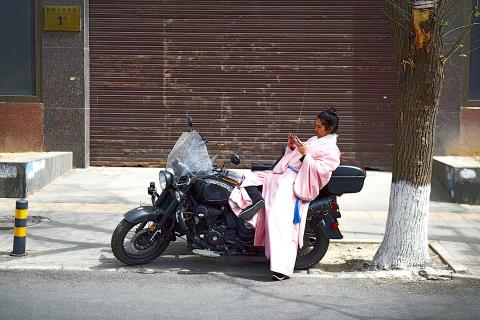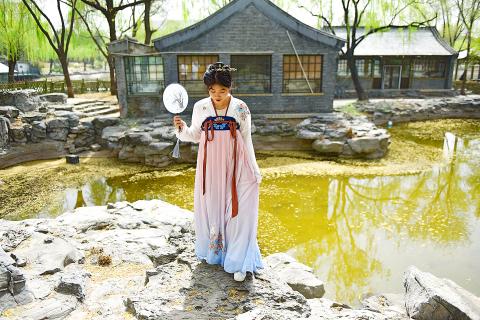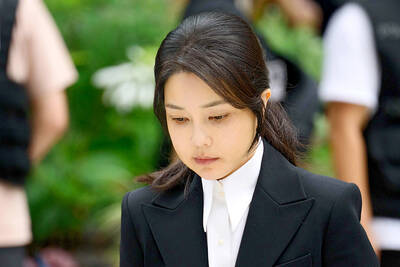Dressed in a flowing long robe adorned with beaded floral embroidery from a bygone era, stylist Xiao Hang looks like she surfaced from a time machine as she strides across the bustling Beijing metro, attracting curious glances and inquisitive questions.
China has embraced Western fashion and futuristic technology as its economy boomed in recent decades, but a growing number of young people like Xiao are looking to the past for their sartorial choices and donning traditional hanfu (漢服, or Han clothing).
These historic costumes of the Han ethnic majority are enjoying a renaissance in part because the government is promoting traditional culture in a bid to boost patriotism and national identity.

Photo: AFP
Period dramas have also contributed to the surge in interest for traditional Chinese garb — The Story of Minglan (知否知否應是綠肥紅瘦), a TV series set in the Song Dynasty, garnered more than 400 million viewers in three days when it debuted earlier this year.
There is no uniform definition of what counts as hanfu since each Han-dominated dynasty had its own style, but the outfits are characterized by loose, flowing robes that drape around the body, with sleeves that hang down to the knees.
“When we were little, we would also drape sheets and duvets around ourselves to pretend we were wearing beautiful clothes,” Xiao said.

Photo: AFP
Xiao, who used to work at a state-owned machine manufacturing company, now runs her own hanfu business, where she dresses customers for photo shoots and even plans hanfu-style weddings.
In modern China, the hanfu community spans the gamut: from history enthusiasts to anime fans, to students and even young professionals.
Yang Jiaming, a high-school student in Beijing, wears his outfit under his school uniform.
“Two-thirds of my wardrobe is hanfu,” he said, decked out in a Tang-style beige gown and black boots at a hanfu gathering, adding that his classmates and teachers have been supportive of his style.
A government-supported revival in Chinese culture has given the hanfu community a boost: Since he entered office in 2012, Chinese President Xi Jinping (習近平) has supported the idea of promoting a Han-centric version of heritage.
In April, the Communist Youth League of China launched a two-day conference for traditional Chinese garb, including hanfu.
A live broadcast of the event drew about 20 million viewers, alongside a visceral outpouring of emotions.
“Chinese people have abandoned their own culture and chosen Western culture. The red marriage gown has now become a wedding dress,” one user wrote on Bilibili, a video streaming platform popular among young anime, comic and gaming fans in China.
Clothes are the “foundation of culture,” said Jiang Xue, who is part of Beijing-based hanfu club Mowutianxia, which has received funding from the league.
“If we as a people and as a country do not even understand our traditional clothing or don’t wear them, how can we talk about other essential parts of our culture?” she said.
There is some way before the style reaches mainstream acceptance in China. In March, two students in Shijiazhuang Medical College in northern China were reportedly threatened with expulsion for wearing the outfits to school.
Others say they are deterred by the odd looks they get when wearing hanfu in public.
“I used to be very embarrassed to wear [hanfu] out,” screenwriter Cheng Xia said.
The 37-year-old said she overcame her reservations after going out dressed in a full outfit last year.
Meanwhile, the movement to revive Han ethnic clothing is raising questions about nationalism and Han-ethnocentrism — a sensitive issue in China where the government is wary of any interethnic conflict.
For instance, within the hanfu community, there is long-running opposition toward the qipao, the high-collared, figure-hugging garment that used to be a staple of women’s wardrobes.
Also known as cheongsam in Cantonese, the qipao began as a long, loose dress worn by the Manchu or “Qi” people who ruled China from the 17th century to the early 1900s.
Its popularity took off in 1920s Shanghai when it was modified into a fitted must-have, favored by actresses and intellectuals as a symbol of femininity and refinement.
“Some people ... think that the cheongsam was inspired in the Qing Dynasty, which is not enough to represent China. There are nationalist undertones in this issue,” Chinese culture academic Gong Pengcheng said.
“It is a good trend to explore traditional culture and clothing culture... There are many things we can talk about, and we need not shrink to nationalist confrontation,” Gong said.
Yang is more upbeat.
“At the very least, we can wear our own traditional clothes, just like the ethnic minorities,” he said.

Nauru has started selling passports to fund climate action, but is so far struggling to attract new citizens to the low-lying, largely barren island in the Pacific Ocean. Nauru, one of the world’s smallest nations, has a novel plan to fund its fight against climate change by selling so-called “Golden Passports.” Selling for US$105,000 each, Nauru plans to drum up more than US$5 million in the first year of the “climate resilience citizenship” program. Almost six months after the scheme opened in February, Nauru has so far approved just six applications — covering two families and four individuals. Despite the slow start —

North Korean troops have started removing propaganda loudspeakers used to blare unsettling noises along the border, South Korea’s military said on Saturday, days after Seoul’s new administration dismantled ones on its side of the frontier. The two countries had already halted propaganda broadcasts along the demilitarized zone, Seoul’s military said in June after the election of South Korean President Lee Jae-myung, who is seeking to ease tensions with Pyongyang. The South Korean Ministry of National Defense on Monday last week said it had begun removing loudspeakers from its side of the border as “a practical measure aimed at helping ease

DEADLY TASTE TEST: Erin Patterson tried to kill her estranged husband three times, police said in one of the major claims not heard during her initial trial Australia’s recently convicted mushroom murderer also tried to poison her husband with bolognese pasta and chicken korma curry, according to testimony aired yesterday after a suppression order lapsed. Home cook Erin Patterson was found guilty last month of murdering her husband’s parents and elderly aunt in 2023, lacing their beef Wellington lunch with lethal death cap mushrooms. A series of potentially damning allegations about Patterson’s behavior in the lead-up to the meal were withheld from the jury to give the mother-of-two a fair trial. Supreme Court Justice Christopher Beale yesterday rejected an application to keep these allegations secret. Patterson tried to kill her

CORRUPTION PROBE: ‘I apologize for causing concern to the people, even though I am someone insignificant,’ Kim Keon-hee said ahead of questioning by prosecutors The wife of South Korea’s ousted former president Yoon Suk-yeol yesterday was questioned by a special prosecutor as investigators expanded a probe into suspicions of stock manipulation, bribery and interference in political party nominations. The investigation into Kim Keon-hee is one of three separate special prosecutor probes launched by the government targeting the presidency of Yoon, who was removed from office in April and rearrested last month over his brief imposition of martial law on Dec. 3 last year. The incident came during a seemingly routine standoff with the opposition, who he described as “anti-state” forces abusing their legislative majority to obstruct